Pasta e Piselli, or pasta with peas, is a colorful, brothy Italian pasta dish starring small pasta, crispy pancetta, and sweet peas. Easy to assemble and full of flavor, this light yet comforting weeknight dinner comes together in 40 minutes or less.
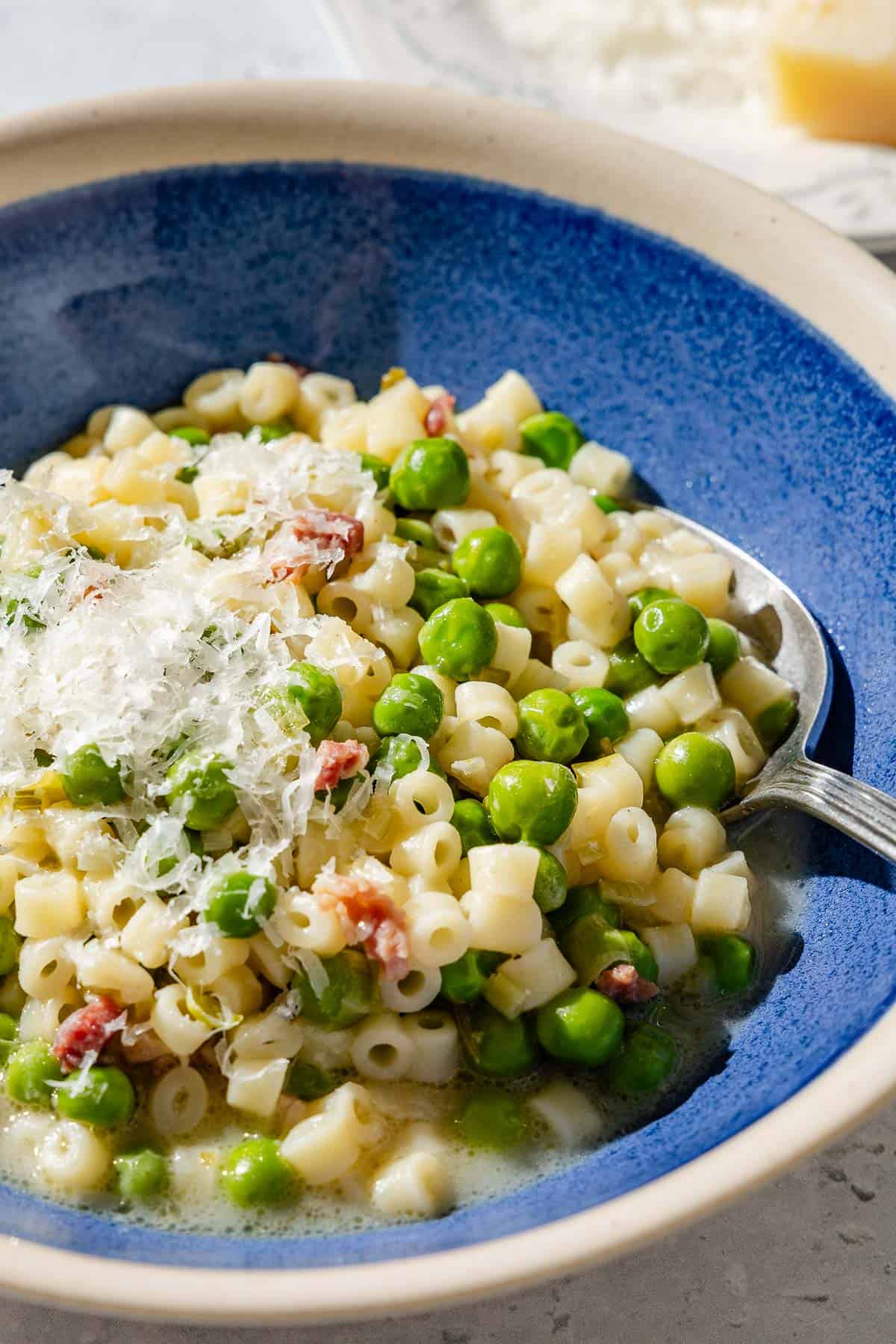
Pasta e Piselli was one of my mom’s go-to dinner dishes, along with Pasta e Ceci and Pasta Pomodoro. She taught Italian and French to high school students, and after a long day in the classroom, she relied on recipes like this classic pasta with peas to get a tasty, nutritious dinner on the table fast.
I love Pasta e Piselli for the same reason. It’s so convenient, but even more so because it tastes so good. Who doesn’t love spoonable pasta, tender peas, and spring onions cooked in broth and flavored with herbs, diced pancetta, and fresh Parmigiano cheese?
This dish lies somewhere between a soup and a pasta asciutta, meaning pasta tossed with sauce but meant to be eaten with a spoon. It’s a great example of traditional Neapolitan cuisine, where they are fond of short pasta shapes like ditalini (small tubes) or conchigliette (small shells) that are cleverly designed to hold sauce or broth and are perfect for “catching” ingredients like peas so that every spoonful satisfies.
Pasta e Piselli is uncomplicated, relies primarily on pantry ingredients (dried pasta and frozen peas), and it delivers on flavor. Serve with a simple, lemony Fennel Salad or a colorful Caprese Salad on the side. In the mood for dessert? Try our Italian Carrot Cake.
Table of Contents
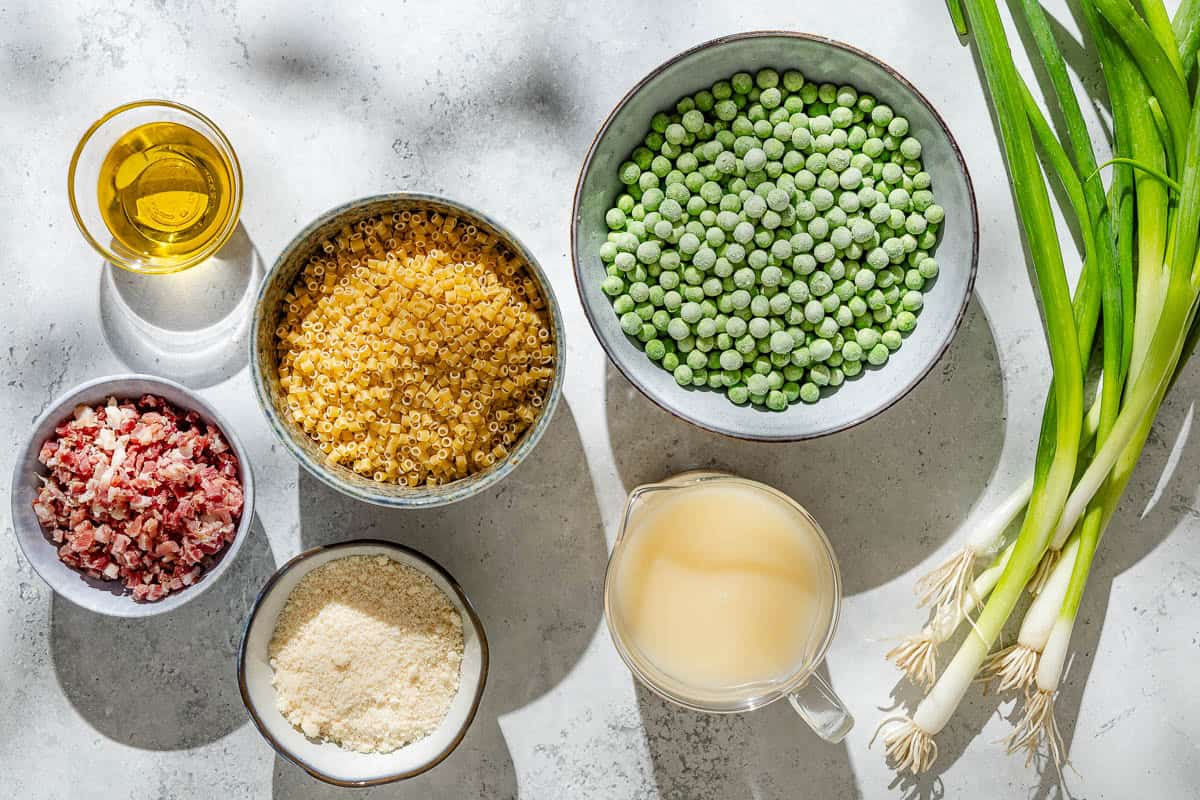
Pasta with Peas Ingredients and Substitutions
I almost always have everything I need on hand to make Pasta e Piselli: small pasta, frozen peas, Parmigiano cheese, and a few other ingredients are all it takes. It’s by no means a fancy dish, but once you make it, it will quickly become one of your favorites.
- Peas: Frozen peas are ideal for this dish, as they are conveniently available year-round. You could substitute fresh English peas, but they have a short season. They are also perishable, as they begin to turn starchy the moment they are picked.
- Extra-virgin olive oil: Any good extra-virgin variety will work well. I used our buttery-smooth Italian Nocellara, which you can find at our shop.
- Spring onion: Young bulb onions, known as spring onions, are sweeter and mellower than more mature onions. Look for either green or red spring onions in well-stocked supermarkets and farmers’ markets, especially in May and June. If you can’t find them, substitute white onion.
- Pancetta: Just a small amount of this Italian cured pork belly adds depth and richness to pasta e piselli. If you want to keep the dish lighter or for a vegetarian option, just omit it.
- Fresh marjoram: Oregano’s more floral cousin marjoram is an underappreciated herb in my opinion! It goes perfectly with sweet peas, so add a generous pinch to your Pasta e Piselli to give the flavor an aromatic boost.
- Broth: Either chicken broth/stock or vegetable broth works well in this dish. Use a good-quality commercial broth (or homemade if you happen to have any on hand).
- Ditalini: This small tubular pasta is just the right size for scooping up spoonfuls together with peas and bits of pancetta. Other good shapes are conchigliette (small shells) or tubetti (similar to ditalini). In a pinch, you can even use spaghetti broken up into pieces.
- Parmigiano Cheese: Freshly grated parmesan cheese provides the finishing touch for this homey recipe.
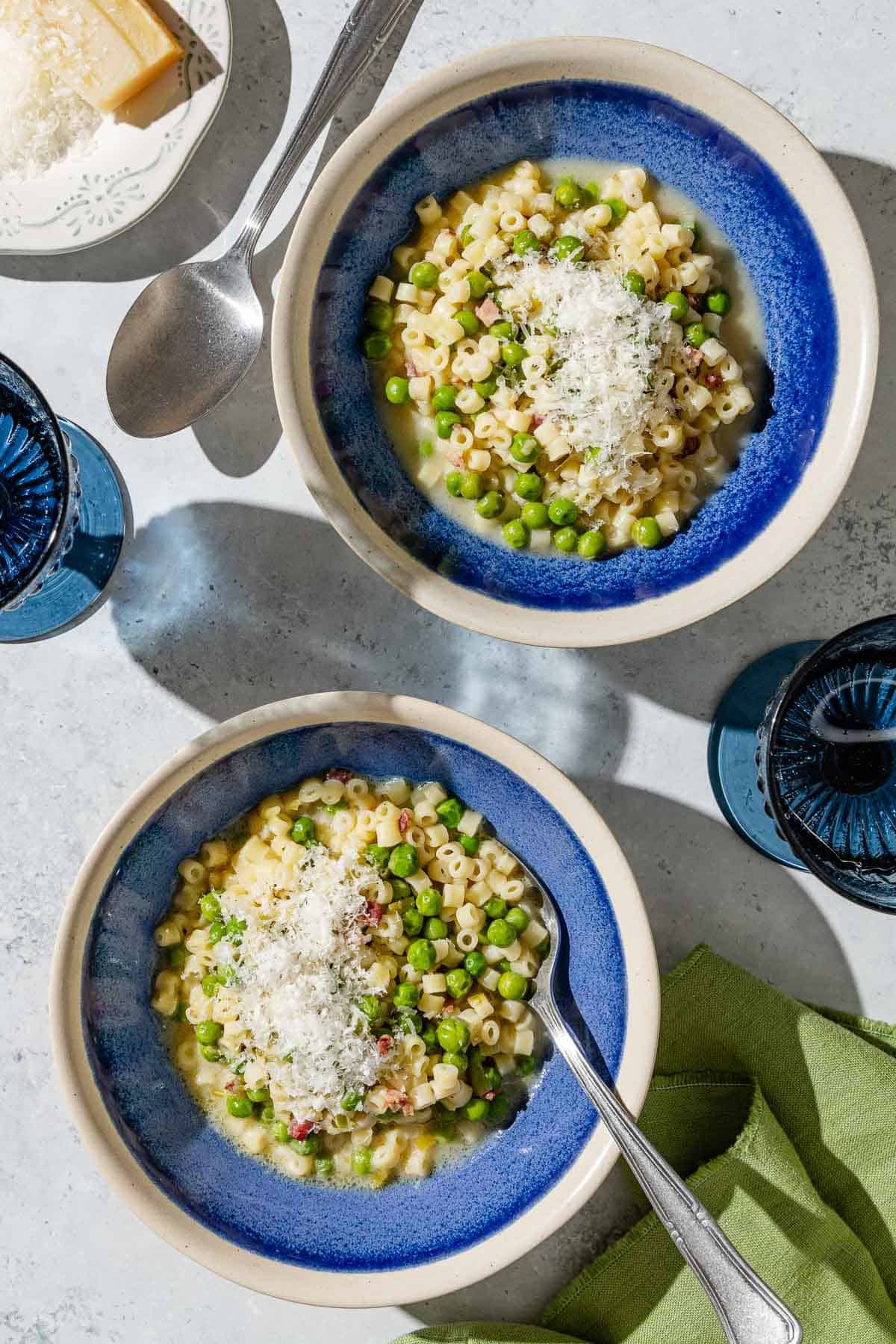
How to Make Pasta e Piselli (Pasta with Peas)
This simple, satisfying dish comes together in about 40 minutes. It’s perfect for dinner when you’re short on time. It’s also a great way to introduce kids to peas! Here’s what you need to do:
Make an Aromatic Broth
- Defrost the peas. Measure out 2 cups of peas and let defrost while you sauté the aromatics.
- Cook the spring onion and pancetta. Warm 2 tablespoons of olive oil in a large, deep sauté pan or Dutch oven and add 1 cup of finely chopped spring onions (or white onion) and 1 1/2 ounces (about 1/3 cup) pancetta, cut into small dice. It takes about 5 minutes to soften the vegetables and the fat in the pancetta. If you’re eliminating the pancetta, use an extra tablespoon of oil to sauté the onions.
- Season the base. Once the onions and pancetta have begun to soften, sprinkle in 1 teaspoon finely chopped marjoram (or 1/2 teaspoon dried), a small pinch of salt, and a generous pinch of black pepper, and let everything cook together for another 5 minutes or so, until the onions are just beginning to turn golden, and the pancetta has started to render its fat.
- Add the broth. Pour in 6 to 7 cups of broth—7 if you want your Pasta e Piselli to be on the brothy side, and 6 if you want it less soupy (I prefer mine brothy). Raise the heat and bring the broth to a boil. Season with another pinch of salt, depending on how salty the broth is.
Cook the Pasta and Peas in the Broth
- Cook the pasta and peas. Stir in the pasta and the defrosted peas—it’s fine if they are still cold or not quite fully defrosted. Return the broth to a boil and then lower the heat to keep it at a gentle simmer. Cook until the pasta is al dente and the broth has thickened. This will take anywhere from 15 to 20 minutes, depending on the shape and brand of pasta. The peas will lose their bright green hue, but this is fine. They should be fully cooked and tender.
- Finish and serve the soup. Turn off the heat and stir in about 1/2 cup grated Parmigiano cheese. Ladle into bowls and top with more cheese.
Ways to Mix It Up
Neapolitans have opinions when it comes to Pasta e Piselli. Purists maintain that you shouldn’t even add Parmigiano cheese to it. But, more commonly, people like to give it their own twist. Here are some ways you can vary your Pasta e Piselli.
- Tinge with tomato purée. Just a dollop of tomato adds another layer of flavor to the pasta with peas without turning it into a tomato-based sauce. Add a few tablespoons—about 1/4 cup—of tomato purée to the sautéed onions and pancetta and cook for about 5 minutes before adding the broth.
- Swap in prosciutto. Prosciutto has a milder, sweeter flavor than pancetta. Substitute the same amount of finely diced prosciutto for the pancetta.
- Drop in a parm rind. This is a good trick if you omit the pancetta (or prosciutto). Drop a piece of Parmigiano-Reggiano rind into the broth as it is heating and leave it in until serving time. It will add depth to the flavor of the broth.
- Add a potato. To add a little heft to Pasta e Piselli, dice up a small yellow potato and add it to the pot along with the broth. The potato will cook in the broth and add a little starchiness to the finished dish.
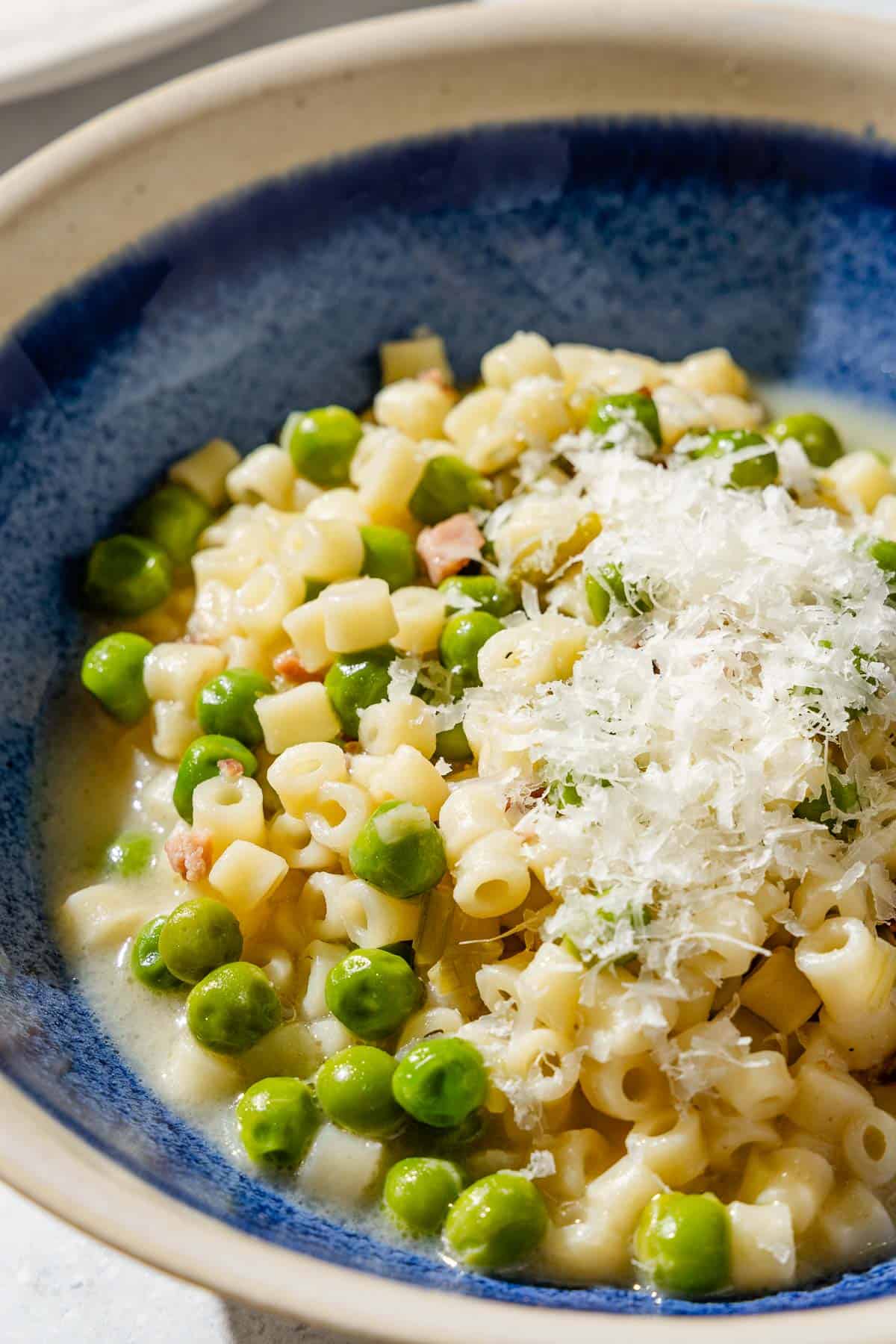
What to Serve with Pasta with Peas
The versatility of Pasta e Piselli is part of its appeal. Serve it as a first course, followed by Simple Poached Salmon. Or enjoy it as a main dish, as my family and I do, with a side of Fennel Salad, a simple Lemon Parmesan Salad, or a delicious plate of Roasted Peppers.
More Weeknight Pasta Recipes
Browse all Mediterranean recipes
Visit Our Shop
Pasta e Piselli (Pasta with Peas)
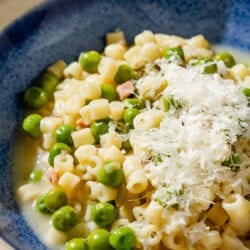
Ingredients
- 2 cups frozen peas, defrosted
- 2 tablespoons extra-virgin olive oil
- 1 cup finely chopped spring onions or white onion
- 1 1/2 ounces (about 1/3 cup) finely diced pancetta (optional, see note)
- 1 teaspoon finely chopped fresh marjoram, or 1/2 teaspoon dried
- Fine sea salt
- Freshly ground black pepper
- 6 to 7 cups best-quality chicken or vegetable broth
- 1 3/4 cups small pasta, such as ditalini, conchigliette, or tubetti
- 1/2 cup freshly grated Parmigiano-Reggiano (parmesan cheese), plus more for serving
Instructions
- Cook the aromatics. Heat the olive oil in a heavy-bottomed high-sided sauté pan or medium Dutch oven over medium-low heat. Stir in the onions and pancetta and cook until the onion is slightly softened, about 5 minutes.
- Season and soften. Stir in the marjoram, a small pinch of salt, and a generous pinch of freshly ground black pepper. Cook for 5 more minutes, until the onion is pale gold in color, the pancetta fat is translucent, and the meat is just beginning to brown.
- Add the broth. Stir in the broth (use 7 cups to make it brothy) and raise the heat to medium-high to bring to a boil.
- Cook the pasta and peas. Stir both the pasta and peas into the boiling broth. Lower the heat to maintain a gentle simmer–medium or medium-low–and cook until the pasta is al dente and the peas are cooked through and have lost some of their bright green color. This will take anywhere from 15 to 20 minutes, depending on the shape and brand of the pasta.
- Serve. Take the soup off the heat and stir in 1/2 cup Parmigiano cheese. Ladle into bowls and sprinkle a little more cheese on top of each serving.
Notes
- Shop this recipe: Visit our shop to browse quality Mediterranean ingredients including the olive oil used in this recipe.
- For a meatless version, omit the pancetta and drop a piece of Parmigiano-Reggiano rind into the broth as it is heating and leave it in until serving time. It will add depth to the flavor of the broth.
- See our chicken stock and vegetable broth recipes for a best-quality homemade option.
Nutrition
Try Our Authentic Italian Olive Oil
Hand-picked and cold extracted Extra Virgin Olive Oil from 100% Nocellara del Belice Sicilian olives.
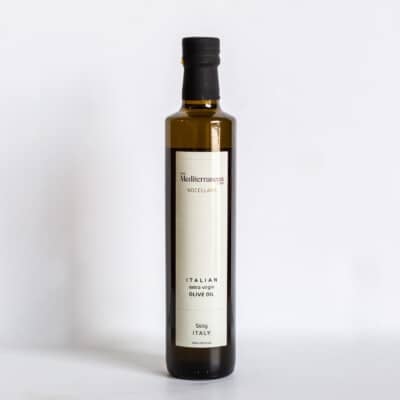

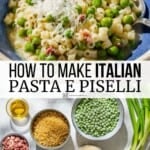

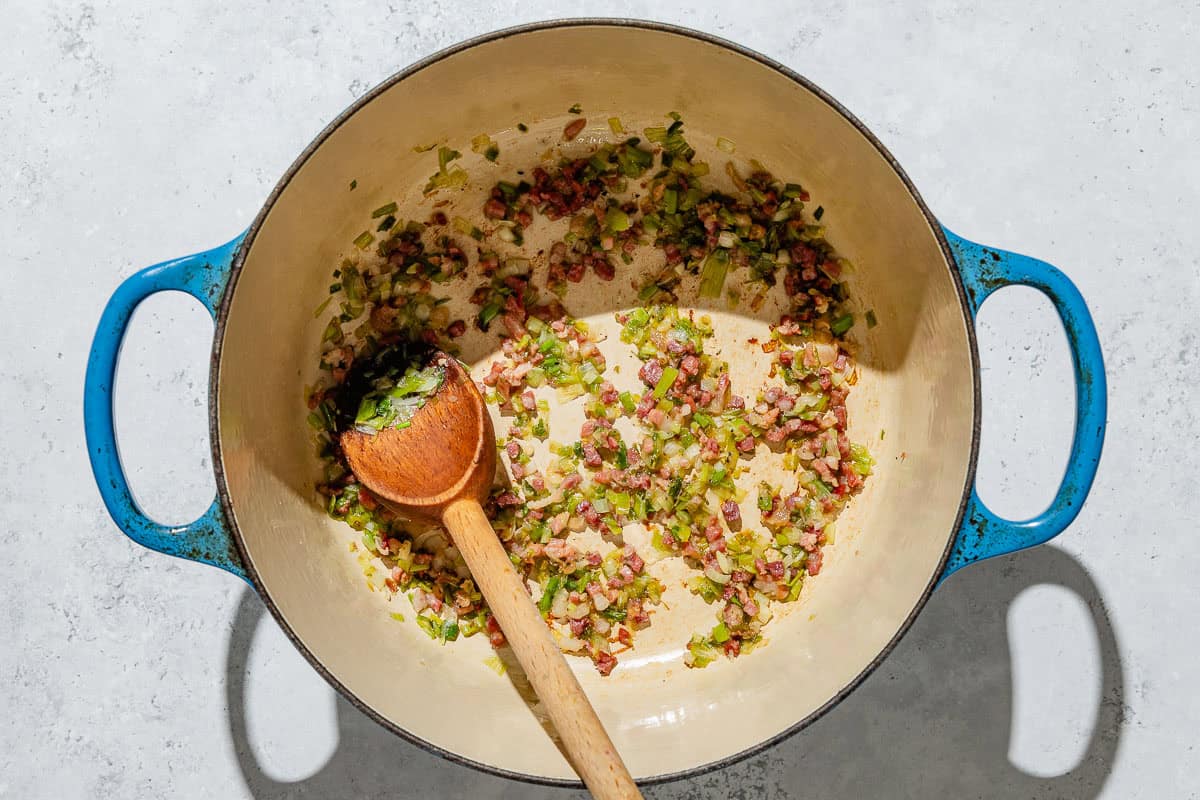
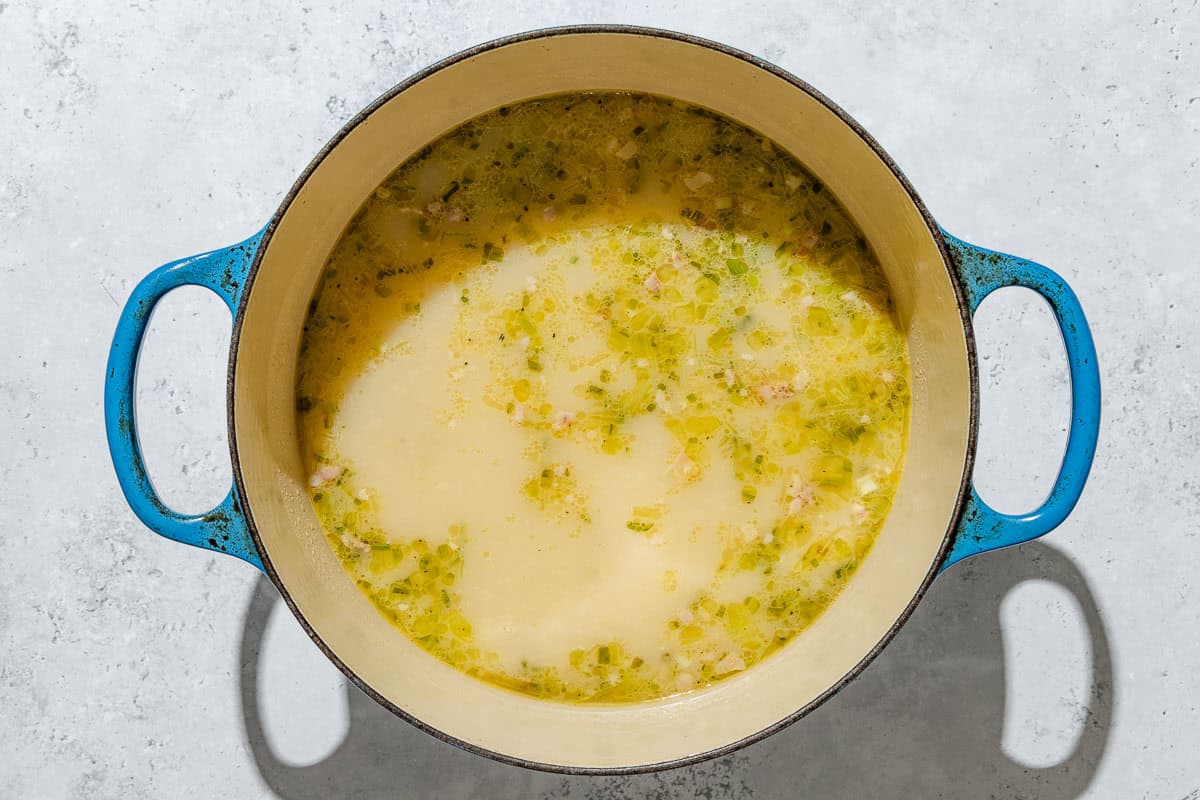
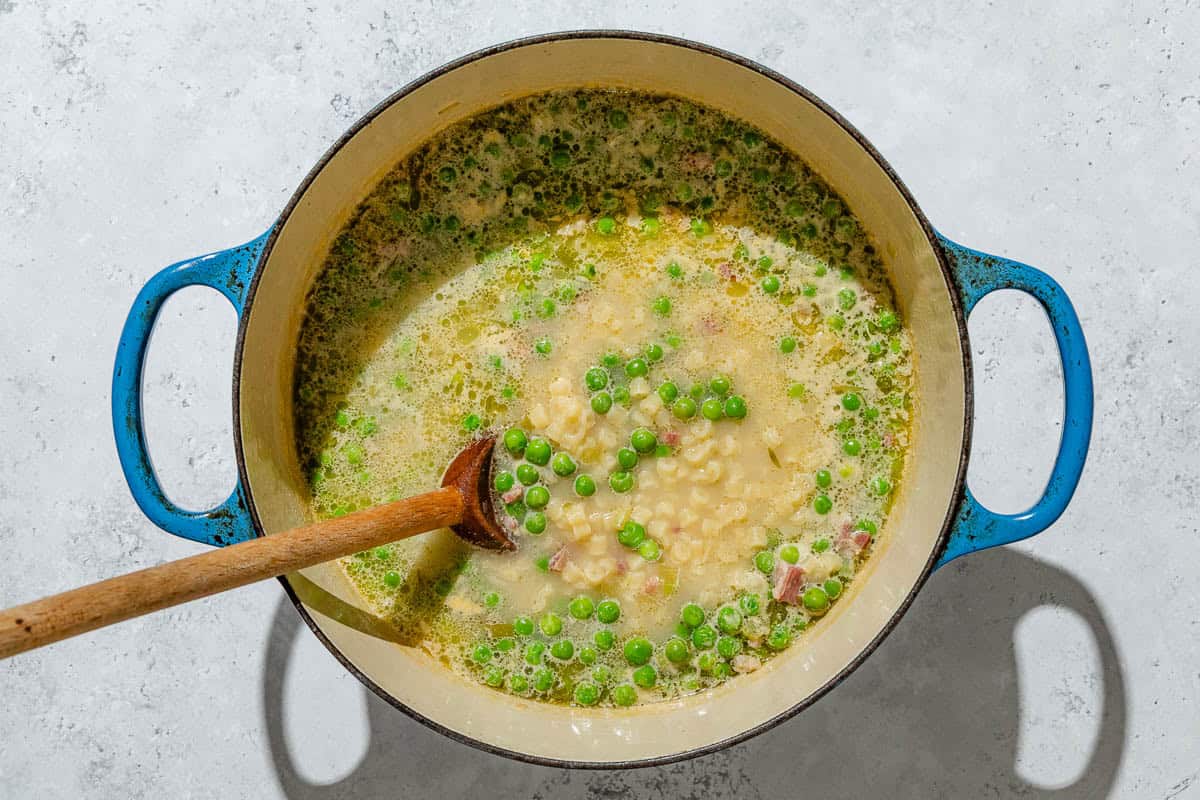
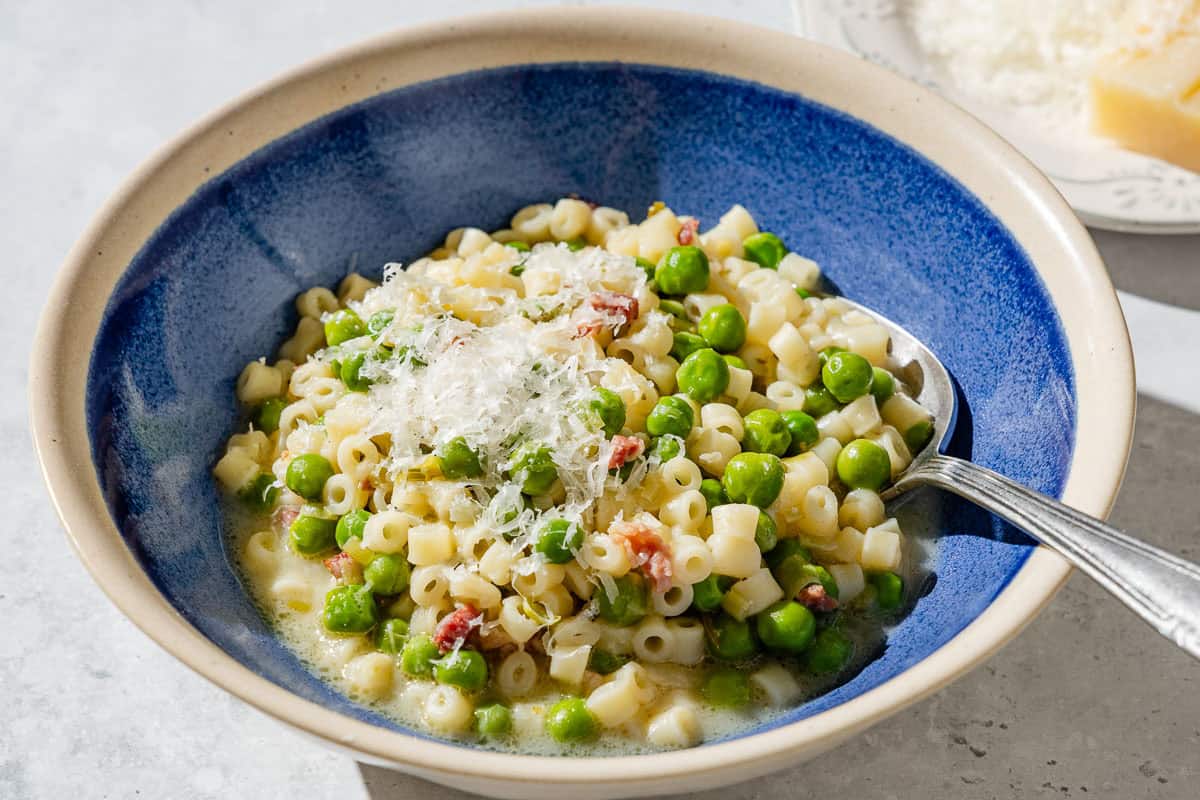
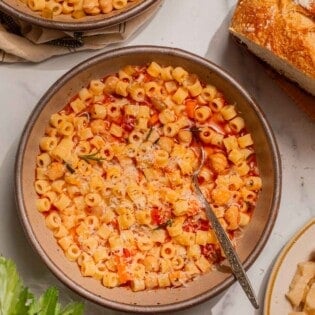
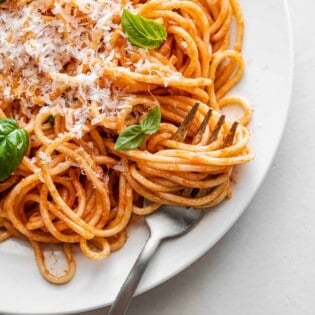
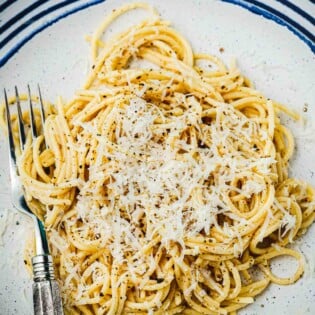
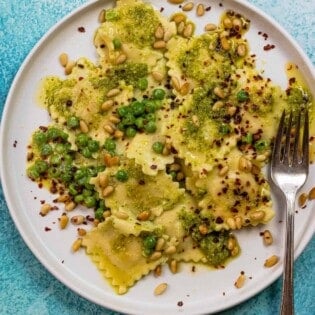
I made this and was very good, will make again
Hi. I’m an insulin-dependent diabetic, who’s being told to get on a Mediterranean Diet and I have been searching everywhere for a good meal plan/cookbook, magazine that will show me how. I know nothing about how to make Mediterranean
Diet food. Please let me know how and where I can get information on this topic. Thank you.
Hi, Judi. Since you have a pretty serious health issue, we really recommend working with a registered dietitian or nutritionalist to help you with creating a Mediterranean Diet meal plan that will fit your needs, as we are not medical professionals. You can click here to check our our Mediterranean Diet page for some good general info, though!
Very soupy even with just 6 cups of broth and 2 full cups of pasta. Would definitely use less broth if I made again. Added more than the recommended amount of pancetta as well and it was still lacking flavor. Thank you for the recipe.
Can I please ask why the peas are cooked for so long when they only really need a few minutes to be sufficiently cooked through? Surely this will remove more of the flavor, sweetness and nutrients than adding them when the pasta has maybe 5 or so minutes left?
Hello! This is just the way our wonderful contributor, Domenica, has always made this recipe. However, if you prefer less-cooked peas, you can definitely add them later than the recipe calls for. When following the recipe, though, while the peas may lose their bright green hue, they should still retain their sweetness while giving up some of their flavor to the broth.
Delicious 😋